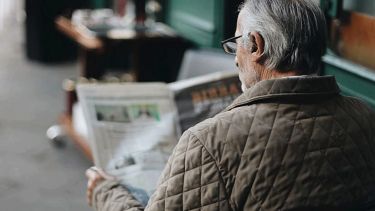Covid-19 and the implications of its ontologically violent messages
By Antonios Ktenidis, Doctoral Researcher at the School of Education, University of Sheffield and member of iHuman.

“I am not gonna die of COVID-19, even if I get contaminated with it. This happens only to those who belong to the vulnerable groups, such as the disabled, those with underlying health conditions and the older”.
This was an utterance, often accompanied by a sigh of relief, that was commonly used when the panic around COVID-19 started spreading. Moreover, the daily announcement of deaths out of COVID-19 triggered two different reactions, depending on the group that the person who had passed away belonged to. If they belonged to the aforementioned groups, then their death ‘made sense’, it was an expected one. On the other hand, if it was a person that did not present any features of ‘vulnerability’ e.g. a young, healthy, able-bodied person, then their death came as a surprise; it was unexpected.
I was and still am very disturbed with both the above statement and reactions – what Liddiard (2020) refers to as ‘ontologically violent messages’ – partly because I have family members and friends who belong to these ‘vulnerable’ groups. It is worth clarifying that I am not frustrated on their behalf, but with the underlying meanings and implications of these messages, which affect my own people (and not only). I focus here on two implications in particular: 1) whose life/death matters and 2) the politics of vulnerability.
In her book Frames of War: When is life grievable? Butler (2009: 38) proposes that:
One way of posing the question of who ‘we’ are in these times of war is by asking whose lives are considered valuable, whose lives are mourned, and whose lives are considered ungrievable. We might think of war as dividing populations into those who are grievable and those who are not. An ungrievable life is one that cannot be mourned because it has never lived, that is, it has never counted as a life at all. We can see the division of the globe into grievable and ungrievable lives from the perspective of those who wage war in order to defend the lives of certain communities, and to defend them against the lives of others—even if it means taking those latter lives.
While Butler discusses grievable/ungrievable lives in the context of war -war has been used as metaphor to describe the current circumstances too-, it is worth considering whose lives (and deaths) are grievable/ungrievable in these times of the pandemic. As illustrated in the above messages, the deaths of those belonging to the ‘vulnerable’ groups were deemed natural and, hence, mattered less, in opposition to the deaths of people who were not vulnerable, and, therefore, their death was ‘unnatural’ and mattered more. A hierarchical division between valuable, grievable lives (and deaths) and invaluable, ungrievable lives (and deaths) is in place, with the former representing lives lived by the subject of neoliberal ableism (Goodley & Lawthom 2019) and the latter representing the state of ‘bare life’ through which disabled people are marginalised (Overboe, 2007; Reeve, 2009).
A central notion in these messages was vulnerability, since it functioned as an explanatory framework through which the deaths of those deemed vulnerable came to make sense. However, as Watts Belser (2020) maintained:
Here’s the other problem with vulnerability: Focusing our attention on the vulnerability of the body makes disabled people’s deaths seem inevitable. It obscures the social and political dimensions of risk. It lets us off the hook for the way we’ve built a world that makes certain people less likely to survive. […] These aren’t body problems. This is ableism in action, working hand in glove with capitalism and white supremacy.
This is what Tremain (2020) refers to as the ‘naturalisation of vulnerability’:
Vulnerability isn’t a characteristic that certain individuals possess or embody. Like disability, vulnerability is a naturalized apparatus of power that differentially produces subjects, materially, socially, politically, and relationally. In short, it is by and through the contingent apparatus of vulnerability and other apparatuses that certain members of the population are vulnerableized.
Not only are certain individuals and populations vulberableised, but through ‘vulnerabilisation’ they are rendered disposable (Runswick-Cole, Goodley and Liddiard, 2020). Who lives and who dies then during this pandemic is not just a matter of biology, but a fundamentally (bio)political matter.

iHuman
How we understand being ‘human’ differs between disciplines and has changed radically over time. We are living in an age marked by rapid growth in knowledge about the human body and brain, and new technologies with the potential to change them.
